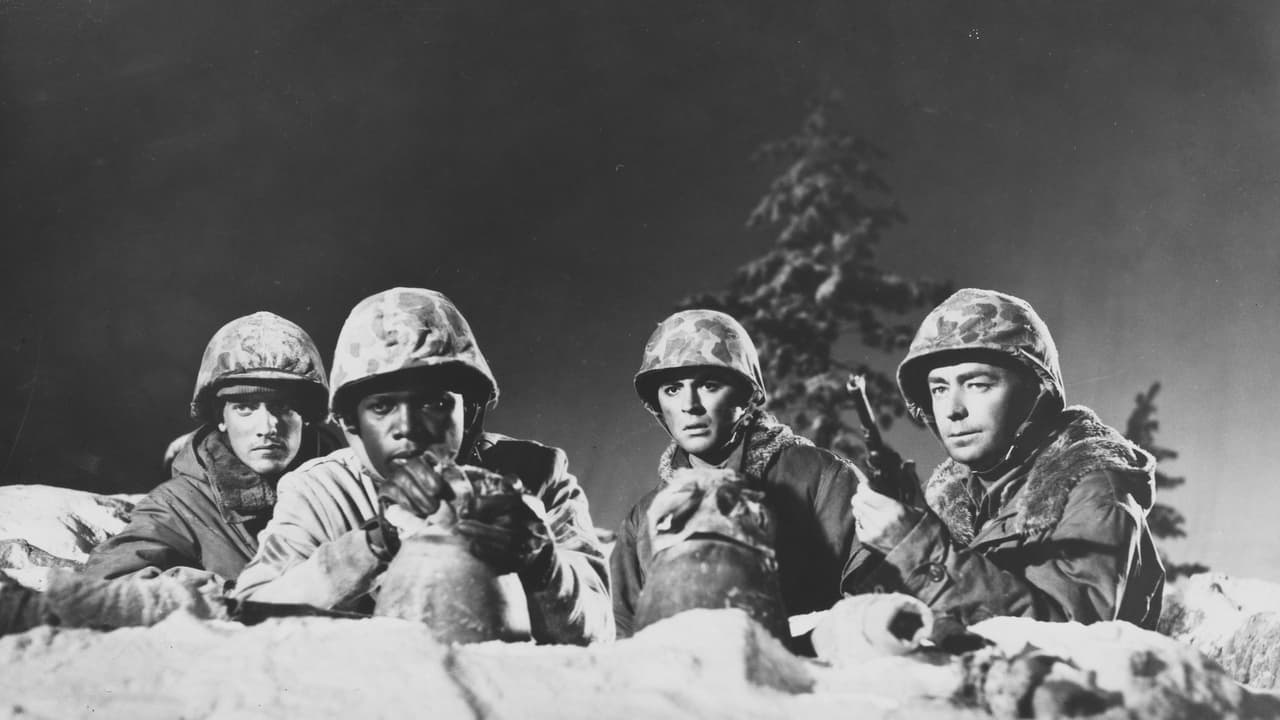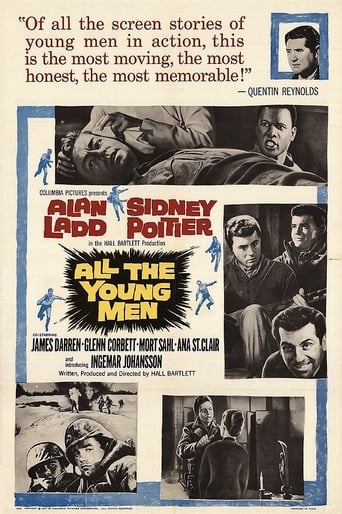



I like the storyline of this show,it attract me so much
View MoreWonderful character development!
Most undeservingly overhyped movie of all time??
Excellent characters with emotional depth. My wife, daughter and granddaughter all enjoyed it...and me, too! Very good movie! You won't be disappointed.
View MoreThe U.S. armed forces were officially desegregated in 1948, and the Korean War (1950-1953) was the first modern conflict in which Americans of every heritage fought side by side. This less-than-spectacular GI movie -- albeit with a couple of big names -- is one of the few instances in which Hollywood has dealt with racial tensions in "America's Forgotten War."The story, set in the dead of a Korean winter, focuses on a squad of Marines holed up in a farmhouse behind Chinese lines. The two main characters are the unit's only black member (played by Sidney Poitier) and its oldest and most seasoned member (played by Alan Ladd). When the young black man finds himself thrust into command of his comrades, the white old-timer is resentful.Poitier and Ladd are the best part of the movie. These two pros have great "anti-chemistry." They play off each other superbly, portraying a mutual dislike that has a grudging undertone of respect. When "All the Young Men" was made, Ladd's star was sinking and Poitier's was rising, and that gives an added poignancy to their confrontation.Unfortunately, the movie doesn't give Ladd's character any identifiable racial motivation, however misguided. Instead, the sin of bigotry is embodied in a lone Marine, a stereotypical white Southerner (played by veteran TV villain Paul Richards). He's not just a racist, he's loathsome in every way. This is a cop-out. Institutionalized racism would never have lasted so long without the acquiescence or subtle support of many "decent" people.And speaking of cop-outs, why does a movie about racial issues give us a Korea almost devoid of Asians? The "Chinese" soldiers keep their faces covered. The main Korean character is played by an Argentine actress wearing Charlie Chan-style eye makeup. In 1960, this sort of thing should have been over. (Though the character sounds Latin American, the movie's explanation of her looks and accent is that she is half-French. The French presence in Korea was never very great, but apparently Hollywood was already starting to confuse Korea with Indochina.)I have to mention the motley crew of supporting characters. The casting is truly offbeat, with such non-actors as comedian Mort Sahl and boxing great Ingemar Johansson. James Darren is on hand to carry a rifle and sing a song, and even Johansson warbles a tune. The least believable scene in the film (and many are none too convincing) is when combat-weary Marines laugh themselves silly over Sahl's meandering monologue about bureaucracy and society. It's the kind of jabber that would put real Marines to sleep.Returning briefly to the issues of race and realism, the character of "Chief," who's supposed to be a Navajo Indian, is played by an actor who looks nothing like a Navajo. But at least he's not wearing eye makeup.
View MoreThis movie benefits from some striking monochrome photography which is particularly well in evidence during its opening scenes ;these show a US patrol proceeding through snow encrusted mountains when it comes under attack from a Communist force .In the resulting battle the platoon leader is killed and hands over authority to the unit's sole black soldier (effectively played by Sidney Poitier)rather than to its most experienced member ,Kincaid (Alan Ladd),to whom the men have always looked up . Thus racial tension and bitterness are added to the already fraught situation as the troop must find a place to make a stand against superior numbers while awaiting reinforcements .There is a difference of opinion over strategy between Ladd and Poitier and other tensions between patrol members who include a Native American ,a wisecracking New Yorker ( Mort Sahl) and a callow youth played by James Darren who also contributes a forgettable song This is no better or worse than many another "patrol"movie with its assemblage of stock figures and seems to have been assembled with an eye to the widest demographic-Old Hollywood in Ladd , a rising newcomer in Poitier and a pop star(Darren ) for the youth market.Even the race angle was not new having featured in Home of The Brave over a decade previouslyGood matinée fare but nothing special either way
View MoreThe special effects were the only (barely) redeeming factor. The music was bad. The dialog was pathetic. The fact that they used Caucasian actors and actresses to portray Asians is a slap in the face to Asians. This is the problem when Hollywood gets its hands on history. Even Saving Private Ryan, which was advertised as fiction, was more historically accurate in terms of dialog, music, and costume. Same goes for U571. Platoon, one of my favorites, as well as Full Metal Jacket, are much better movies simply because those who made them chose to make them authentic in spite of their fictional plots. Pass this one by. It is almost as bad as The Green Berets.
View MoreAll the Young Men is a film about a marine patrol in Korean War where the lieutenant in charge is killed in the first couple of minutes of the film. His last words are to tell the sergeant that he's now in charge, to complete a mission by taking a strategic farm house.Seems natural enough, there's a sergeant who's the next ranking one on the scene. The joker in the deck is that this sergeant is black, played by Sidney Poitier. In 1951 the Armed Services were newly integrated and the civil rights revolution was but a few years off.Poitier has the support of most of the men. Two he doesn't have, the first is southern redneck Paul Richards and the second is seasoned marine Alan Ladd. Ladd's the guy who should have been in charge, but Ladd hasn't the stripes of authority as he's been busted for doing things his way in the past.The problem with the film is that Ladd just doesn't convey in it that he is a maverick spirit. We see him doing things in the Alan Ladd heroic mold and we're never given any reason to see why he wouldn't still be a sergeant and in charge. His problem with Poitier isn't racial, but there seems to be no reason for the conflict to be happening at all.Alan Ladd and Sue Carol Ladd refused to see that he was growing older and had to transition into character parts. They kept him going in action films almost to the very end. In this case it was their own doing as Ladd's Jaguar Productions was a co-producer.Even with an artificial conflict All the Young Men does have some good moments. In addition to Poitier, Ladd assembled a good cast of young players to guarantee some box office. Dick Davalos, Lee Kinsolving, Glenn Corbett and most of all current teen idol James Darren are some of the men on patrol.Mort Sahl who was the Bill Maher of the 1960s plays the patrol radio operator and manages to work in some of his monologue from his comedy act into the film. Definitely some needed comedy relief. And it has an appearance by the then heavyweight champion Ingemar Johanssen. During that year 1959-1960 he was champion, the Ladds befriended Johanssen and gave him a brief part in this film. It didn't lead to a movie career after Johanssen lost the championship back to Floyd Patterson while All the Young Men was still in theaters.
View More